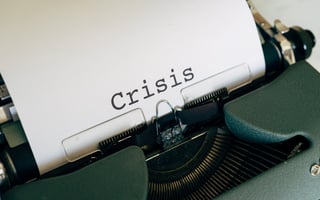On our crisis communication training courses, we often look at examples of how others managed their...
On our crisis communication training courses, we often talk about how smartphones have given people the power to be reporters.
They can record footage on their phones, post it on social media - or sell it to a newspaper.
And if the footage is damaging, a brand could be scrambling to prevent reputational damage caused by something that may well have previously gone unreported.
There was a great example of this last week.
Parcel delivery firm Hermes found itself looking at some uncomfortable social media posts and headlines when video footage emerged of one of its drivers hurling packages into the back of a van.
The footage was captured from a flat above a shop in Gloucester where the company collects parcels.
The occupant had been disturbed by “banging” and used his phone to capture the scene.
He then posted it on Facebook, where it has now been watched more than one million times and the courier’s behaviour was met with an angry response.
And, as we often point out on our crisis communication training courses, as the post gained momentum, it was picked up by the mainstream media.
The publication of these stories then took the story back to social media, where it began to trend on Twitter. During parts of Thursday (5/11), the only topic that was trending higher on that network in the UK was the US election.
This is why I pay extra for my parcels not to be delivered by Hermes pic.twitter.com/AKJ38mg3DE
— #EndSARS (@MayoAKA) November 5, 2020
I know a brand doesn’t care about me when I see Hermes are delivering my items https://t.co/0x4egFPofz
— RUM ROCKSTAR (@Sebby_LO) November 4, 2020
Doesn’t surprise me. One of the worst delivery companies out there: When brands use HERMES as the default delivery service, I clear my cart. https://t.co/w8gYtZ78iY
— Zeena (@ZeenaXena) November 5, 2020
The delivery company responded with a statement that said the man seen in the footage was an agency driver who has now been “removed from the business.”
It added: "We would like to reassure people that this behaviour is not acceptable or representative of our standards and values.
"Our local teams are working hard to ensure a good service during these challenging times and we thank people for their ongoing support and understanding.”
This was a damaging story that would not have been covered without the video footage taken by a member of the public. Yet, interestingly, this was not the only example of citizen journalism involving Hermes.
At the same time as the ‘hurled’ packages story, the Liverpool Echo was reporting the company’s staff were being told to sort parcels ‘on wet ground’, making them dirty and causing them to disintegrate.
That story included photos taken by one of the drivers of parcels sat outside on wet ground at a depot.
So, what does this mean for your organisation?
Technology has empowered people to not only take a more active role in sharing news but also in capturing it. They can report what they see as they go about their day-to-day lives.
Consequently, citizen journalism needs to be seen as something that could trigger a crisis and it is something that needs to be planned for in crisis communication plans and then tested.
Things that may have previously gone unreported – partly because a camera crew would not have been able to get there in time - can now be quickly captured and shared. And it has the potential to be just as damaging as the more traditional causes of reputational crises.
To limit the damage, you need to be able to respond quickly. Once someone has captured something like the Hermes footage, they typically post it in just a few minutes.
And the story and a damaging narrative can quickly build without any intervention – I can’t find one example of Hermes responding to the story on social media.
The best way to be able to meet the tight timeframe – and some people argue you may have less than 15 minutes to do so if you are going to assert any control on the story – is to use holding statements.
These can be prepared in advance and adapted to meet the specific situation you need to manage.
No-one is expecting huge amounts of detail in these responses. Your customers want to know that you are aware of what has happened and that you care. In fact, they need to know that you care more than they care what you know.
And this was something that was missing in the Hermes statement. There were some components of a good crisis response, including action – with the driver no longer working for the company – and some reassurance.
But there was no concern for those who may have had their goods damaged or broken by the antics of the driver.
The other key to being able to respond quickly is vigilance. Closely monitor what people are saying about your brand, your products and your leaders. And because crises have a habit of happening outside of normal working hours, this monitoring needs to happen outside of the 9-5.
Citizen journalism can pose another threat to your organisation’s reputation. But like other risks, careful preparation and testing is key to putting you in the best position to emerge with your reputation unscathed.
Find out more about planning for a crisis and anticipating your organisation’s vulnerabilities, by downloading our free crisis eBook.
Media First are media and communications training specialists with over 30 years of experience. We have a team of trainers, each with decades of experience working as journalists, presenters, communications coaches and media trainers.
Find out more about our crisis communication and social media training courses.
Subscribe here to be among the first to receive our blogs.




